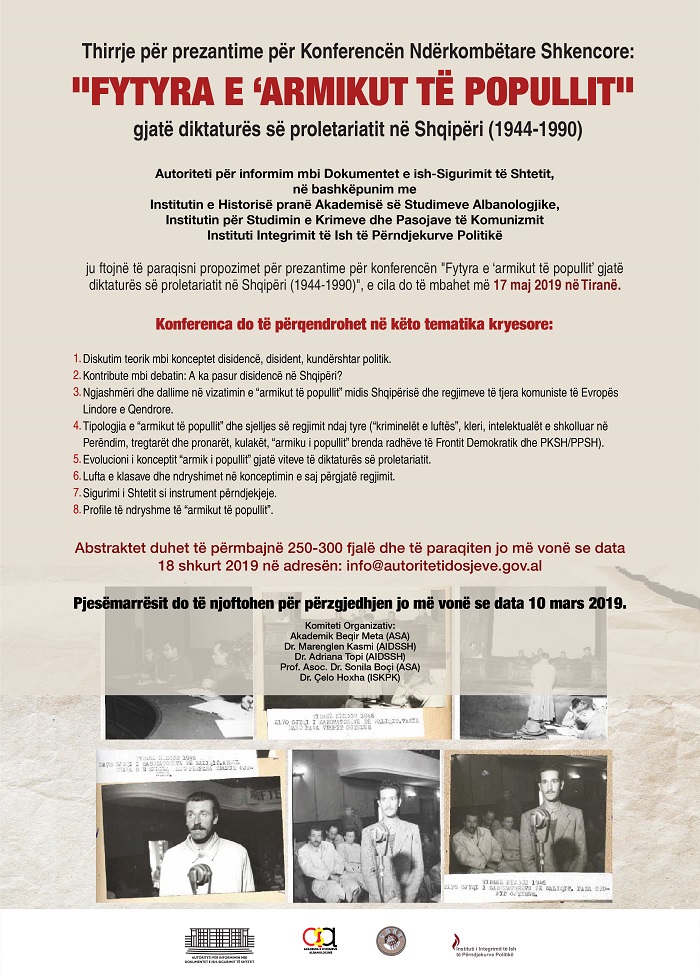“The face of the ‘enemy of the people’ during the dictatorship of the proletariat in Albania (1944-1990)”
Various theories on totalitarianism define it as an antidemocratic, non-parliamentary, one-party political regime in which “the individual and society belonged to the state, considered not only as a moral and spiritual entity capable of representing the nation, but also of totally assimilating the various branches of civil society”. Put more clearly, the most important feature of totalitarian regimes is the complete and detailed control of all ideas, beliefs and expressions. Totalitarian regimes seek, therefore, to create a uniformed state and to ensure blind obedience to power from society.
Achieving extreme uniformity is extremely challenging as long as human society includes people with different individualities, views, convictions and beliefs. The totalitarian regime needs to ensure the obedience of the majority and to intimidate or/and eliminate by various means and forms that undesirable minority, which could become an obstacle to leadership. In this process, violence exercised through special institutions (secret service, prisons, internments, forced labor) and propaganda imposed, both by the state-controlled media and by mass organizations, are the two key pillars that ensure the longevity of a dictatorial regime. In a way, the regime needs the figure of the “enemy of the people”, who is sometimes depicted as an individual who endangers the general well-being of society and sometimes as a “traitor” who plays with the independence and sovereignty of the state.
The regime established in Albania began life from the very beginning as a totalitarian regime, based on the model of the Soviet state led by Stalin, the new government of the CPA was based on the same methods and methodologies. All those who lived during the years of the “dictatorship of the proletariat” in Albania were fed day after day with the concept of the “enemy of the people”. The regime did not hide that the “dictatorship of the proletariat” was essentially “violence of the majority against a privileged minority”. This slogan justified not only the violence exercised against real or imaginary political opponents, but also created the necessary public cohesion, which would serve the implementation of the power of the leaders of the CPA/CPA.
The purpose of this conference is to bring attention to and open a multidisciplinary scientific and public debate on the mechanisms used by state and party bodies to create the gap between real or potential political opponents and the rest of the population; the typology of "enemies of the people".
The Authority for Information on the Files of the Former State Security, in cooperation with the Institute of History at the Academy of Albanological Studies, the Institute for the Study of the Crimes and Consequences of Communism and the National Historical Museum, invite you to submit proposals for presentations for the conference "The Face of the 'Enemy of the People' during the Dictatorship of the Proletariat in Albania (1944-1990)", which will be held on May 17, 2019 in Tirana.
The conference will focus on these main topics:
Theoretical discussion on the concepts of dissidence, dissident, political opponent.
2. Contributions to the debate: Was there dissidence in Albania?
3. Similarities and differences in the depiction of the “enemy of the people” between Albania and other communist regimes in Eastern and Central Europe.
4. Typology of the “enemy of the people” and the regime’s attitude towards them (“war criminals”, clergy, intellectuals educated in the West, merchants and landowners, kulaks, “enemy of the people” within the ranks of the Democratic Front and the CPSU/CPLA).
5. Evolution of the concept of “enemy of the people” during the years of the dictatorship of the proletariat.
6. Class struggle and changes in its conception throughout the regime.
7. State Security as an instrument of persecution.
8. Various profiles of the "enemy of the people".
Abstracts should contain 250-300 words and be submitted no later than February 18, 2019 to
the address: info@autoritetidosjeve.gov.al
Participants will be notified of their selection no later than March 10, 2019.
Organizing Committee:
Academician Beqir Meta (ASA)
Dr. Marenglen Kasmi (AIDSSH)
Dr. Ardiana Topi (AIDSSH)
Prof. Assoc. Dr. Sonila Boçi (ASA)
Dr. Çelo Hoxha (ISKPK)
Dr. Dorian Koçi (MHK) For conference applications, click HERE
